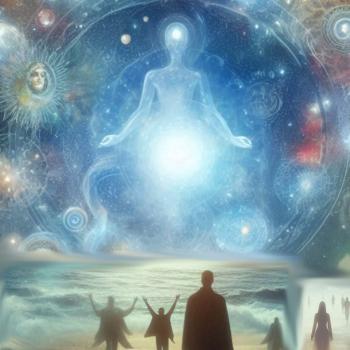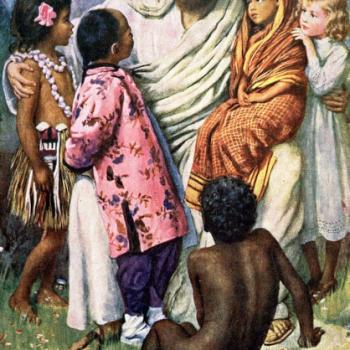Love Your Enemies but Jesus Love Sends Them to Hell?
The unresolved conflict in Christianity is that we’re to love our enemies, but Gods’ justice for them sends them to Hell. Surprise! Judaism (our Old Testament, AKA Hebrew Bible, or Torah) had no doctrine about a heaven or hell – the grave was the end. What happened to create this emphasis on Hell?
The idea of both were circulating before Jesus, possibly thanks to 200 years of Greek and nearby Persian religious influence. So he had to address both Heaven and Hell during his ministry.

Image composition by Dorian Cole,
from Stux on Pixabay (for blog use) and Matin Labar on Flickr
Hell is the opposite of Love – both are produced by actions leading to mental states.
Torn from history
Many read the Bible as if they could tear it out of its historical moorings and spread it like butter. That’s like saying that because the color blue isn’t mentioned in the Bible (it isn’t), it didn’t exist, and we should probably disregard it now.
The color spectrum says that blue and green are two of the seven colors: red, orange, yellow, green, blue, indigo, and violet. I’m sure some will formulate this as: if it doesn’t say it in the Bible, it doesn’t exist, so the sky isn’t blue, it’s a shade of green, and science lies. Well, believe what you want and good luck with that.
Things were different back then
The Sadducees, who were the Temple leaders, were not believers in immortality, Heaven, or Hell – they were very strict about following the Hebrew Bible (Old Testament) explicitly, as was Jesus, so to the Sadducee there was no immortality for people.
The Pharisees were more flexible in their beliefs. They followed not just the Hebrew Bible, but also followed the teachings of the fathers known as the Oral Torah. Sometimes they placed the Oral Torah above the written which Jesus scowled at.
The Scribes and Pharisees were somewhat open to new beliefs such as Heaven and Hell. The Scribes were generally responsible for interpreting the law for communities throughout the land. They and the Pharisees had to make The Law work. For the Scribes and Pharisees, interpreting the Bible as to what the Law meant also meant was it palatable to the public. This meant endless reinterpretation and sometimes rewriting. We don’t like to think in those terms but evidence is they also reused prophecy that had been fulfilled, and they rewrote passages that would have been disgusting to the public.
The Essene influence
While Jesus followed the Hebrew Bible (Torah), his beliefs were also similar to John the Baptist and other Essenes. The Essenes were a mystic Jewish sect and thousands of Essenes lived in Jewish and Roman territories. They formed an enclave by the Dead Sea and kept religious writing safe by storing them in caves (Dead Sea Scrolls). The Old Testament writings found there are regarded by many scholars as more original than later copies.
The Essenes believed in baptism as a symbol for washing away sins (forgiveness), and that the end was at hand. Rather than force people to go to the Temple and sacrifice for forgiveness, both John and Jesus baptized, saying that a priest and sacrifice were not necessary for forgiveness. This brought great opposition from the ruling religious leaders who wanted to preserve the Temple sacrifice tradition – it was good business and maintained power.
Was the end at hand that Jesus prophesied? Jesus spoke almost exclusively to the Jews, and actually the end was at hand for the nation of Judaism, and for their practice of sacrifice for sin. In 70 AD the Temple was destroyed by the Romans, ending Temple sacrifice, and by 128 AD the Jewish people hid in the mountains to avoid merciless destruction by the infuriated Romans. They were obliterated or scattered to the wind. The Sadducee sect disappeared. Jesus’ prophecy said all this would happen.
The Essenes and Jesus were somewhat more progressive or refined in their beliefs believing that the soul is immortal and baptism was a symbol of sins being washed away and forgiven. Jesus was a clarifier, reformer, and agent of change pointing to a new future for Jews. We have similar things going on today.
Jesus on Hell
Generally Jesus taught that for those who remain unrepentant for mistreating others, their soul remains in torment. You can’t ignore God and mistreat others without your soul be affected. He likened this isolation and suffering to several things: Gehenna, Hades, Sheol, all common words at the time. He said eternal suffering is like being thrown into the trash, ending life in the grave, being cast into outer darkness, or burning in a lake of fire. Not fun stuff, but reality for those who harm others and don’t ask forgiveness.
Later writers in their lust for punishing or influencing others created novel ideas about levels of hell, etc. But that stuff is just nonsense – not Biblical. God forgives all who ask for anything they’ve done, sometimes despite our objections. The only sin that maybe can’t be forgiven is turning away from God and never asking for forgiveness. For this our soul is in torment until we find forgiveness. Bu this is human logic – we can’t comprehend the mind of God.
Jesus explained and demonstrated for us the best way for us to live with those with whom we have strong conflicts. The way is to love them – that is, compassion, want the best for them. If they truly are unrepentant for what the do to others when they die, their soul suffers simply by knowing and living with what they’ve done.
It’s not for us to judge others. Those who die without forgiveness (Christ) are judged by their works. That’s up to God to decide not us. We are simply told not to judge and to forgive or we won’t be forgiven either.
Take Home points
The debate over Heaven and Hell is tiresome and pointless.
We don’t know much about Heaven or Hell, or judgment. What we do know about is we must have forgiveness for ourselves and others. And we know how we are to live and treat others as Jesus showed us.
Our focus as Christians has to be on living, not dying. It has to be on forgiving others and treating them well or we risk our souls being in torment for things we have done.
___________________
Our answer is God. God’s answer is us. Together we make the world better.
– Dorian












